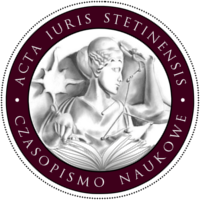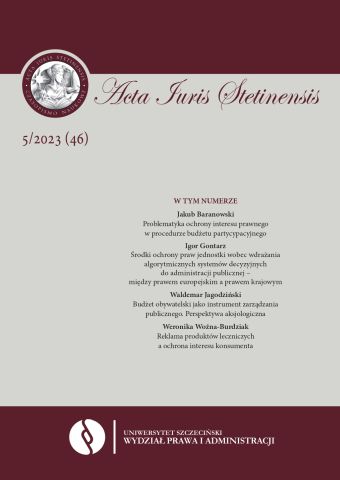






| Authors: |
Igor
Gontarz

Uniwersytet im. Adama Mickiewicza w Poznaniu |
| Keywords: | algorithmic decision-making systems artificial intelligence act judicial review of administration protection of the individual right to good administration |
| Page range: | 16 (55-70) |
| Downloads ?: | 40 |
| 1. | Algorithm Tips, Algorithm Tips – Resources and leads for investigating algorithms in society, https://db.algorithmtips.org/db.AlgorithmWatch, Atlas of Automation – Automated decision-making and participation in Germany, wyd. 1, kwiecień 2019, https://atlas.algorithmwatch.org/en. |
| 2. | Chauhan A., Towards the Systemic Review of Automated Decision-Making Systems, „Judicial Review” 2020, t. 25, nr 4, DOI: 10.1080/10854681.2020.1871714. |
| 3. | Fundacja Centrum Cyfrowe, Klub Jagielloński, AlgoPolska, lipiec 2019, https://centrumcyfrowe.pl/algopolska-raport/. |
| 4. | Kuzub J., Rejestracja bez profilowania – zmiany w urzędzie pracy, 10.05.2019 r., Zielona Linia, https://zielonalinia.gov.pl/-/rejestracja-bez-profilowania-zmiany-w-urzedziepracy. |
| 5. | Nowakowski M., Ostatnie zmiany w ramach prawnych dla sztucznej inteligencji w Unii Europejskiej – krytyczna analiza, „Prawo Nowych Technologii” 2021, nr 2. |
| 6. | Schartum D.W., Law and algorithms in the public domain, „Etikk i praksis – Nordic Journal of Applied Ethics” 2016, nr 1, DOI: 10.5324/eip.v10i1.1973. |
| 7. | Veale M., Borgesius F.Z., Demystifying the Draft EU Artificial Intelligence Act, „Computer Law Review International” 2021, nr 4, DOI: 10.48550/arXiv.2107.03721. |